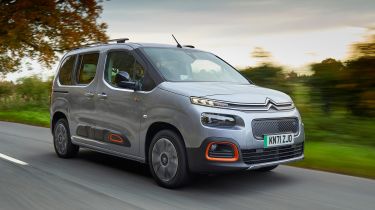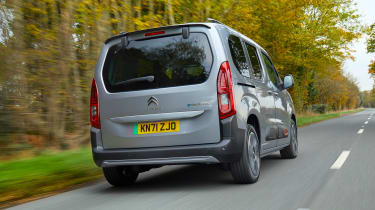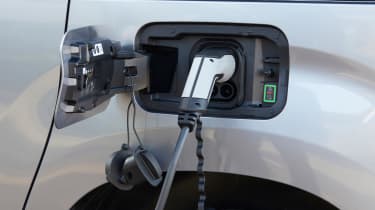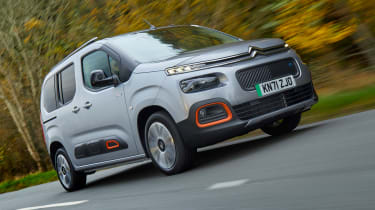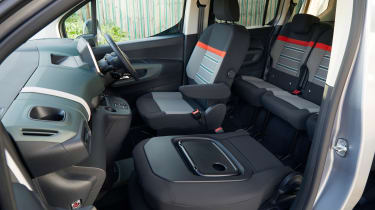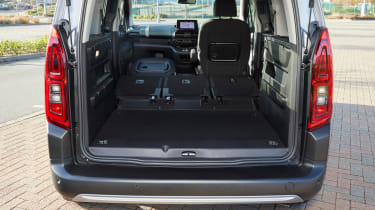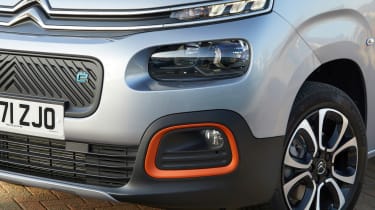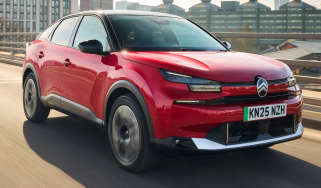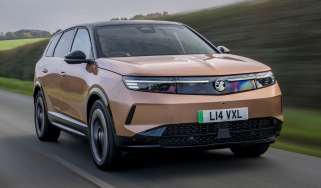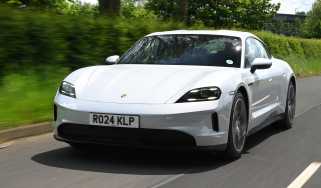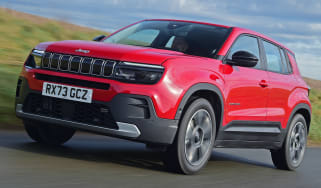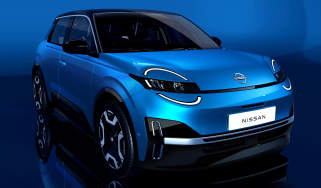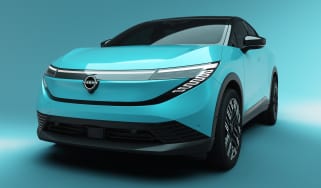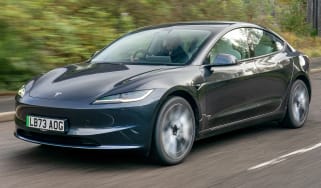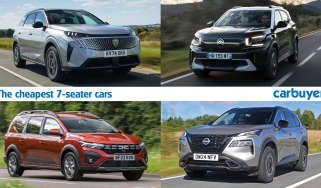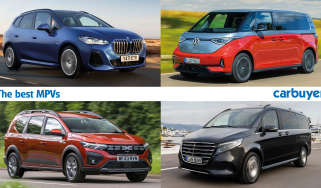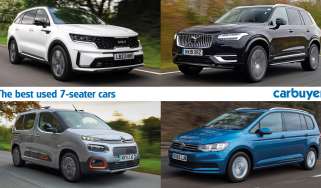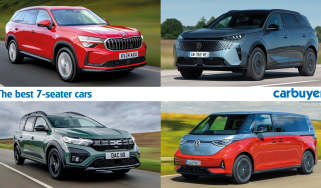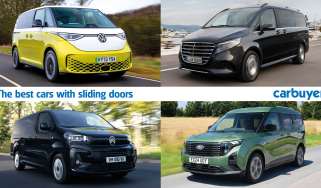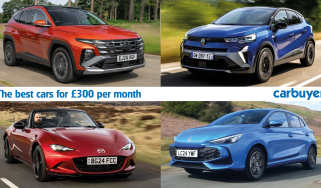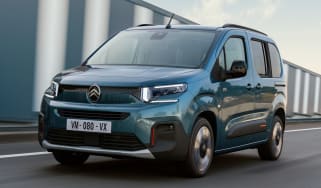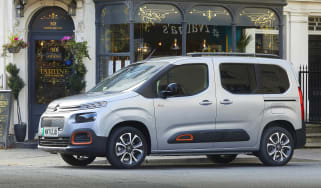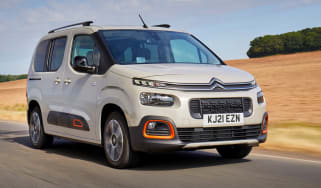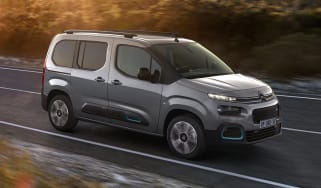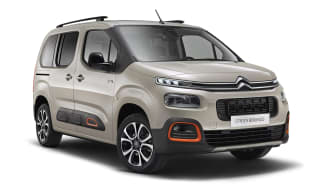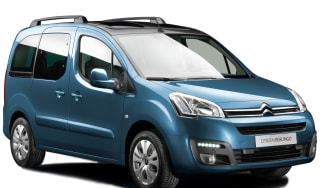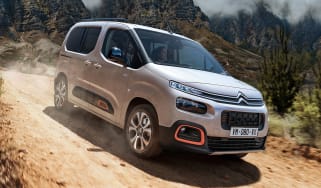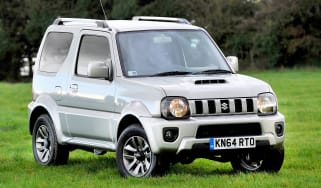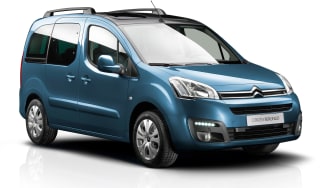Citroën Berlingo MPV review
“The Citroen Berlingo MPV was very ‘no-frills’ before, but now has a surprisingly nice interior, lots of kit and Citroen’s latest safety features”
Pros
- Hugely practical
- Improved design
- Electric option
Cons
- Poor 174-mile EV range
- Door mirror wind noise
- Huge tailgate
Verdict - Is the Citroen Berlingo a good car?
The Citroen Berlingo pioneered the concept of offering customers a small van-based MPV in 1996 and has since become something of a phenomenon, racking up well over 3.3 million sales and developing a cult following around the world. From parents with young children, to dog owners and people who need a car which can double as a van for work, plus drivers who have outdoor hobbies, all love the Berlingo’s practicality and clever design. While it was EV-only for around a year, it’s now once again offered with electric, petrol and diesel power.
Citroen Berlingo models, specs and alternatives
Although it is still clearly a van-based MPV, the Citroen Berlingo is a much smarter product than it once was, both in terms of design and technology. It has stylish touches borrowed from Citroen’s SUV and crossover range, mixed with a fantastically practical interior. It shares most of its hidden parts with the Peugeot Rifter and Vauxhall Combo Life, but the Citroen gets arguably the most stylish nose. For 2023 petrol and diesel engines have also been reintroduced alongside the pure-electric e-Berlingo, following significant customer demand.
A slim upper grille is flanked by LED lamps, while the Berlingo’s headlights are sunk into the front bumper. On the sides, there are two 'Airbump' strips which should help shrug off parking knocks, while chunky roof rails mean you’ll be able to carry bikes or more luggage should the need arise. The latter is unlikely to be necessary in five-seat mode, though, when there's a huge 775 litres of space in the boot. Upgrade from the standard Berlingo M to the XL version (which is 35cm longer) and this grows to 1,050 litres – that’s about the same as a supermini with the seats completely folded!
More reviews
In-depth reviews
The XL can be ordered with seven seats and access to the rear is easy thanks to large sliding side doors – a real boon in tight parking spaces, especially for parents struggling with young kids and child seats. The tailgate is huge to help load luggage, but the Berlingo also has a separate opening glass hatch, meaning you can access the boot in tight spots without having to move the car forwards.
The interior is a far better place to be than before, with almost no feeling that you’re driving a model closely related to a van. The materials look and feel plush and there’s a striking infotainment system. It’s also good to know that Citroen hasn’t held back on safety features, despite the Berlingo’s affordable nature. No less than 19 assistance features are available to make driving safer and less stressful.
From 2022 to early 2023, the Berlingo was only available as a fully electric e-Berlingo model. The electric motor suits the MPV well, with smooth acceleration and no gearchanges making it extremely easy and relaxing to drive. If its 174-mile range is a concern for longer trips, it can be topped up from 10-80% in around 30 minutes using a 100kW public charger.
As of spring 2023 the Berglino is now being offered with combustion engines again: a 1.2-litre petrol and 1.5-litre diesel in a variety of power outputs from 99 to 128bhp, most of which are capable of more than 50mpg, although engine choices are tied into certain trim levels. The petrol works well despite its comparatively small capacity, so it’s our pick if you don’t yet want to make the switch to electric. However, if you’re looking to fully load the Berlingo often, tow with it or cover lots of miles, the extra pulling power and fuel economy of the higher-power diesels can make more sense.
The top 128bhp version of the diesel engine is available with an automatic gearbox and there’s even the option of off-road technology, which uses selectable driving modes for different surfaces, just like on expensive SUVs. It won’t give you the same grip as a 4x4 but it might be useful for drivers who occasionally encounter rough roads and slippery situations.
MPG, running costs & CO2 emissions
Despite its practicality, the Berlingo has been designed from the outset to be cheap to run, and while it went electric only for around a year from 2022, it’s now also available with the same small engines as Citroen’s other family cars.
The e-Berglingo is fitted with the same 50kWh battery pack you'll find in the Citroen e-C4 or Peugeot e-2008, and here it can get the somewhat boxy e-Berlingo around 174 miles on a charge. That might be a tough pill to swallow for owners used to a range around double that with a diesel engine, but the e-Berlingo is at least fitted with 100kW rapid charging. Stop off for some lunch after 150 miles or so of driving, and a 30-minute charge can take the battery from 10-80%, which should be enough range to complete all but the longest of trips.
Drive the e-Berlingo around town and its range should be sufficient for around a week of driving, or you could top it up each night and start each day with a full charge.
Of course, its zero-emissions powertrain has a big effect on running costs, not only because electricity is a lot cheaper than petrol or diesel. There's also free VED (road tax), and the e-Berlingo is currently exempt from ULEZ and the London Congestion Zone, along with most similar low-emissions zones. Company-car drivers stand to make big savings too; the e-Berlingo is in the lowest Benefit-in-Kind (BiK) band for calculating liability.
If you’d rather stick with combustion engines, these were reintroduced in spring 2023, and the PureTech 110 manual is our pick for low-mileage drivers. This 1.2-litre petrol is expected to return around 45mpg. Run one for business use and it'll fall into a more affordable Benefit-in-Kind (BiK) band than a diesel.
If you have a high annual mileage, it could be worth seeking out a diesel instead for the additional miles between refills and superior fuel economy. The BlueHDi 100 model will be the thriftiest, returning just shy of 60mpg, while the same engine with 128bhp manages shouldn’t be far behind.
VED (road tax) for petrol and diesel Berlingos will set you back the standard annual rate, while Citroen servicing is as affordable as for other mainstream brands. We’d also expect the insurance groups for the petrol and diesel versions to be slightly lower than the e-Berlingo.
Engines, drive & performance
Chances are you won’t be buying an e-Berlingo for the way it drives, but this also means you might get a pleasant surprise from behind the wheel. It almost always feels like a car – rather than a van – and there’s plenty of composure and grip from its chassis and tyres.
Despite its tall roof and reasonably high seating position, there’s not too much lean in corners, while a tight turning circle and light steering make manoeuvring a breeze. The suspension is also supple enough to allow your passengers to nod off or play games without complaints about a bouncy ride.
Citroen has concentrated on making the Berlingo ride smoothly, and for the most part it’s pretty good, but sharp bumps can be felt around the interior. There’s also quite a bit of wind noise, particularly from the large door mirrors at higher speeds.
The electric motor has 134bhp and can get the e-Berlingo from 0-62mph in around 11.5 seconds, so it won't be challenging a Tesla Model X away from a toll booth. Like all EVs, though, it does have instant torque when you press the pedal which makes it feel quicker than its figures suggest, especially at urban speeds.
Now the Berlingo is no longer EV-only, we are big fans of the 108bhp 1.2-litre petrol, which is smooth and pleasant to use. However, it can feel a little strained if you plan on carrying passengers in all seven seats, at which point the extra grunt of the 1.5-litre diesel starts to make sense. The range-topping diesel engine is also available with a slick eight-speed automatic gearbox that's well suited to the Berlingo's nature.
It's worth noting that not every engine was available throughout the range. The PureTech 110 petrol and BlueHDi 100 diesel are only offered with Feel trims. Meanwhile, the range-topping BlueHDi 130 diesel is the only combustion engine available in the top Flair XTR guise.
Interior & comfort
Although it's based on a van, the third-generation Berlingo is a big step forward in terms of design and technology. The dashboard has been given a much more upmarket feel than before, with better materials and some of the quirky touches from Citroen's C4 Cactus and C3 Aircross models. It’s easier to use, too, with direct controls for the heating and ventilation, so you don’t have to fiddle around with menus.
You’ll still be using the touchscreen a lot, though, and the eight-inch display now perches above the dashboard. Apple CarPlay and Android Auto are now standard. Thanks to the sheer amount of space inside, the Berlingo has an airy feel, with a huge windscreen and tall side windows. Citroen has also devised interior ‘ambiences’ to make the most of the space. The standard version is mostly grey, with the occasional dash of green, while Metropolitan Grey adds a strip of green and a China Grey dashboard. The Resada Green ambience adds green upholstery with an orange stripe.
Trim levels are called Feel and Flair XTR, and standard kit includes 16-inch alloy wheels, LED daytime running lights, an eight-inch touchscreen, DAB radio and Bluetooth. Meanwhile, the top Flair XTR spec brings 17-inch wheels, gloss black roof rails, front and rear scuff plates, tinted rear windows and orange fog light surrounds.
Practicality & boot space
First things first, there are two versions of the e-Berlingo: the shorter ‘M’ and 35cm longer ‘XL’, while the petrol and diesel engines are limited to the ‘M’ bodystyle. While these feel identical for front passengers, the XL offers more space and the option of a third row of seats, and a bigger boot.
Of course, this choice will come down to how you plan on using your e-Berlingo, but given even the standard M has a vast 775-litre boot (in five-seater mode), most buyers are likely to go for the cheaper version. The XL sees boot space grow to a supersized 1,050 litres and in both you can fold the seats down with a foolproof set of levers in the boot, or on the seats themselves. Impressively, once the seats are down, they also leave a flat loading area for sliding items over. Choose seven seats and the back two can be removed from the car entirely when they aren’t needed.
Another neat trick is a flat-folding front passenger seat, so if you need to carry a particularly long item like a surfboard or grandfather clock, the Berlingo M can accommodate something up to 2.7 metres long, while the XL stretches this to just over three metres. Getting objects in shouldn’t be an issue, thanks to the huge tailgate, but that can be a bit of a nuisance in tight car parks or in a garage. Luckily, Citroen has recognised this and made the rear window open separately, allowing you to pop smaller items inside.
Every aspect of the Berlingo has clearly been designed with families in mind, and this is encapsulated by its 186 litres of interior storage spaces. That’s more than the entire boot of some city cars. Choose the Modutop and there’s also a long roof locker, a bit like the one you’ll find in an airliner.
Reliability & safety
The Berlingo has been a very successful model for Citroen – it was its top-selling car in 17 countries in 2017 and more than 3.3 million have been made since 1996. As it's based on commercial hardware, you’d also expect it to be pretty tough, but we’ll have to see if there are any niggles with the third-generation model. The fact Citroen was 28th out of 29 manufacturers in our 2021 Driver Power owner satisfaction survey, but shot up to 13th position in 2022 is positive news. Around 19% of Citroen owners reported a fault within the first 12 months of ownership. The brand came fifth overall for fuel economy and running costs, while seventh for practicality is no doubt bolstered by models like the Berlingo. However, scores for its infotainment systems were on the low side, and reliability was in the bottom third of the table.
Safety has taken a real leap in the latest Berlingo, with no less than 19 driving assistance systems offered. These range from lane-departure warning and autonomous emergency braking to a colour head-up display and adaptive cruise control. In Euro NCAP crash tests it managed four out of five stars, with an impressive 91% score for adult occupant protection. It dropped points in the vulnerable road users category because of its tall bonnet and stiff windscreen pillars, while its autonomous braking system is unable to detect cyclists.

